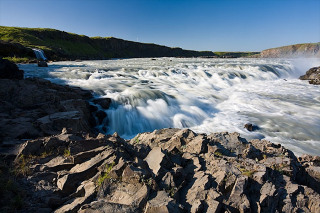Mar 11 2012
2 Comments
Plans to Dam Lower Þjórsá River Put on Hold
Three planned dams in lower Þjórsá river will not be included in a parliamentary resolution for Iceland’s Energy Master Plan, according to sources from within both governing political parties. While some might see this as a reason for celebration, one should think twice before opening up the champaign bottles as these news do not imply that this highly controversial dam project has permanently been thrown off the drawing tables. The project will simply be moved from the exploitation category to the pending category and might eventually end up in the hands of the political parties most of all responsible for Iceland’s heavy-industrialization.
Since the publication of the long-awaited Energy Master Plan’s second phase in July last year, a good part of the discussion regarding the plan has been centred around the Þjórsá river, especially as the two concerned ministers — Minister of Environment Svandís Svavarsdóttir and Minister of Industry Katrín Júlíusdóttir — presented their proposition for a parliamentary resolution for the Master Plan, wherein the three Þjórsá dams were included. Following a three months long public commentary process — including 225 commentaries by individuals, organizations and companies, of which more than 70 had specifically to do with Þjórsá — the above-mentioned ministers have been working on amending their proposal in order for it to go through parliamentary discussion before the end of parliament sessions this spring.
The Energy Master Plan, which is supposed to lay the foundation for a long-term settlement upon the future exploitation and protection of Iceland natural resources, is split into three categories, of which two are quite clear, titled “exploitation” and “protection”, but the third one, titled “in waiting”, has pretty much been the bone of contention. On the one hand those in favour of extreme energy extraction believe that too many exploitable areas are being kept in waiting, while on the other hand environmentalists think that many of the areas categorized as in waiting should rather be moved straight into the protection category. Read More

